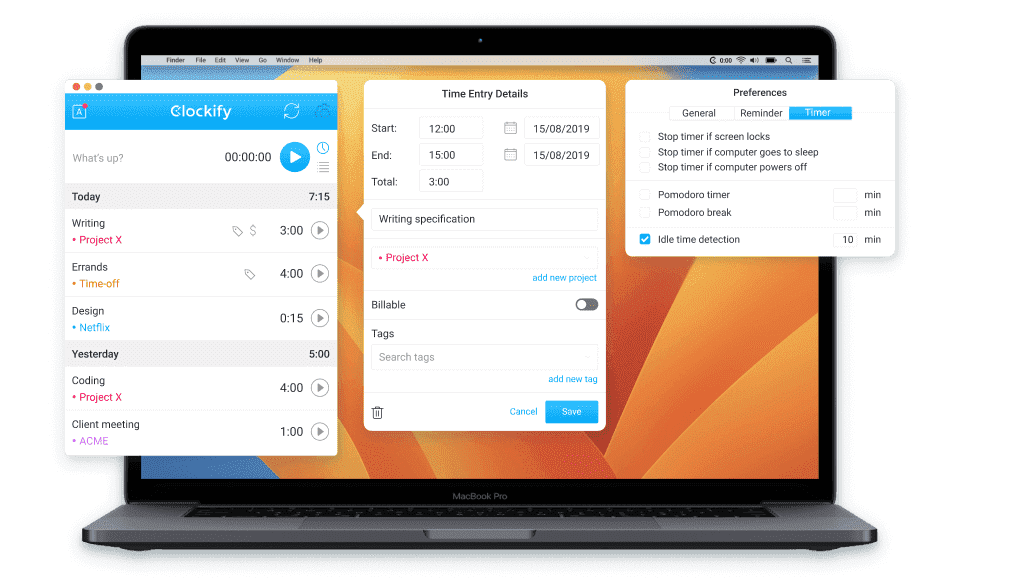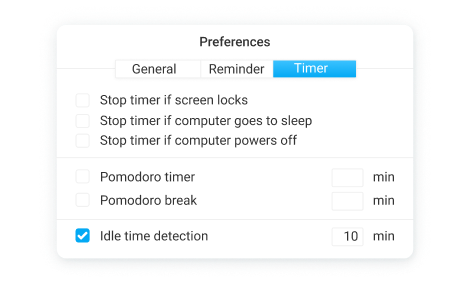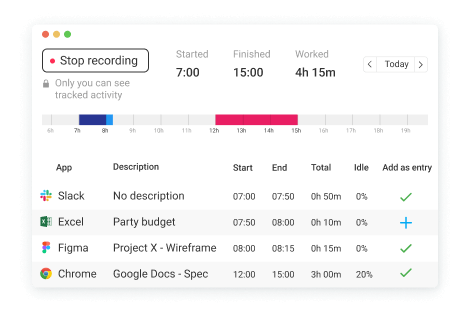Many of us make the mistake of thinking about work after we’re long finished with it. Some even do it regularly.
Sadly, the inability to detach from work has notable consequences for your careers and personal lives — including fatigue, memory issues, and burnout.
With that in mind, let’s explore 13 ways to unplug from your workday and stay more productive in the long run.

What happens when you don’t unplug from work
Unplugging is the act of creating a clear divide between your work and the leisure time you spend with family, friends, pursuing personal well-being, and engaging in hobbies. It’s an essential part of your work-life balance.
According to research from the University at Buffalo, mental and emotional recovery in off-work hours is crucial for maintaining consistent energy levels and productivity.
Without activities that act as a buffer between work time and personal time, people remain in “work mode” all day. As a result, they don’t have the time to recover from stress before the next workday. When they start working the following day, they’re already exhausted and mentally unprepared.
Other studies on workaholism have also found that lack of detachment from work leads to:
- Exhaustion and burnout,
- Worsened work performance, and
- Lack of self-control and mood swings.
For remote workers, setting proper recovery conditions is even more complicated. Their homes are their workspaces, wedged between the kitchen and the living room.
Simply, it’s hard to unplug from work without a physical boundary between home and the office.
💡 CLOCKIFY PRO TIP
Always feeling like you could be doing more, even when you’re objectively productive? Here are 4 tips that may help:
Benefits of an end-of-workday ritual
An end-of-workday ritual can be the perfect bookend to your day at work.
Especially for remote workers, this ritual creates a tangible signal that the workday is over and it’s time to turn to your personal life.
When you set a firm boundary between your career and personal life, you’ll reduce the risk of burnout and have more daily energy.
According to a faculty survey at Duke University, end-of-workday rituals or “shutdown” rituals work amazingly in practice, especially for those in demanding positions. However, the key is for everyone to find what specific activity works best for them.
Let’s explore some ideas for end-of-workday rituals that might suit you.
Ritual #1: Write reminders and lists to your “future self”
Make a list of things that need to be done the next day and place it on the desk or use scattered post-its — whatever catches your eye first. This activity is great because it lets you scrounge your brain for those last bits of information, effectively “cleaning it out” for the rest of the day.
What’s more, a pre-prepped plan for tomorrow can kickstart your productivity when you come back to work. Think of it as taking care of your “future self.”
Bonus activity: Set your planned work hours in a time tracker one day in advance. It’s slightly more preparation, but it saves you a lot of time the next day.
Track work hours with Clockify
Ritual #2: Engage in positive conversations
When you get home, try to avoid cliché questions like:
- “How was everyone’s day?”
- “How was school?”
- “Did anything fun happen today?”
Focus on asking more specific questions, like: “Have you seen that new TV show?” or “What’s the weirdest thing you’ve heard today?”
As we all know, dinner conversations after work and school can get awkward at best, and depressing at worst. So, help everyone shift into “personal mode” with interesting, positive questions that stir up an engaging conversation.
Such questions shift the focus from work stresses and the day, easing your mind for the rest of the day. After a few days, these conversations will become a fun habit everyone looks forward to.
Ritual #3: Find a relaxing video game to play
After shutting off my work laptop, one of my favorite activities is walking the dogs to physically exit my home “work office.” But, as I get back, I start up a low-effort video game. For the next few weeks, it’s going to be Stardew Valley — where you start with hand-me-down tools and a few coins, and fix up your grandfather’s old farm.
For some of my close friends, more action-packed games are preferred options for relieving stress, like Red Dead Redemption or Assassin’s Creed.
Video games are another excellent buffer between work and personal time. Because they engage your brain through audio-visual stimuli, it’s difficult to think about work while immersed in a game.
Schedule time for work and play
Luckily for us, choices are endless: you can download a small app, play a round or two on the way home, play a multiplayer game with housemates or family, or just spend half an hour in a digital space that detaches you from the working mind. Half an hour to an hour is often more than enough.
💡 CLOCKIFY PRO TIP
Need some inspiration for fun games that also help you practice time management? We’ve got a bunch of ideas for you right here:
Ritual #4: Merge walks and chores
To signal the end of a workday, you can also do something productive and finish up a chore or two. For example, groceries or other kinds of shopping.
It comes like a nice transition into free time, and I feel like I used my free time productively for something more “tangible.” And when I get home, I have a nice little conversation starter with my partner.
Similarly, you can walk the dog, take out the trash, ask a friend or family member you haven’t seen in a while for a stroll, or something else.
Ritual #5: Write a journal entry
It doesn’t have to be a personal journal, but a professional one. Take a few minutes to put your thoughts on paper while the day is still fresh in your head. And if there’s nothing of note to write about, try describing the general atmosphere at work, how you felt, and if there was anything that affected you, positively or negatively.
According to the University of Rochester Medical Center, journaling is useful because:
- You empty your mind and sort your thoughts,
- You can look back on the journal later for self-evaluation,
- You acknowledge the potential red flags of a toxic workplace, and
- You self-reflect more frequently and learn from your mistakes.
💡 CLOCKIFY PRO TIP
Want other tips for improving the quality of your work life? Check out this handy guide:
Ritual #6: Clean up your workspace
Cleaning out your digital workspace or desk as you finish your workday gives your brain time to mull over the day’s events. It can recoup, analyze, and remind you of anything you might have pushed aside.
Additionally, this clean-up is a great way to greet your “future self,” who will take a seat at a clean desk the next day.
Ritual #7: Leave a small task last
Your end-of-workday routine can also be wrapping up smaller non-urgent tasks, like:
- Emailing, clearing out your inbox, sorting your mail,
- Checking in with a coworker about a task or a project that is due soon, and
- Making a plan for the next day, along with a to-do list, etc.
If checking off quick and easy tasks is a more fulfilling conclusion to your workday, then go for it! Swap out any menial tasks of the day for bigger ones, and leave those as a “cooldown” before heading home.
💡 CLOCKIFY PRO TIP
Looking for smart ways to manage your time and be more productive? Give the pickle jar theory a try:
Ritual #8: Listen to a podcast
Find a podcast that you’ll listen to when you finish work. It can be whatever you like, including:
- Life and career coaches,
- True crime,
- Productivity podcasts, or
- Interviews.
Start doing this daily, as soon as you log off. Train your brain to relax whenever the podcast comes on. Naturally, the podcast needs to be engaging, so you don’t wander off thinking about the approaching deadline.
Ritual #9: Make an end-of-work playlist
According to research from the American University in Dubai, music can improve your mental health and cognitive function — especially useful after a long workday. While I never had an actual playlist, I did have a mental library of songs I loved. And usually, by the time I’m done with work, I know the kind of music I’m in the mood for.
I would leave the office, earphones in ears, and YouTube at the ready. My walks home got noticeably lighter as my brain wandered, trying to recreate the music video to the current song.
And in that scramble, the next thing I know, I’m at my doorstep, feeling fully refreshed. Whether you choose to walk to your favorite songs, work out, or dance, music is a great stimulus that wears out your brain.
Ritual #10: Say goodbye to everyone in the office
The Japanese office culture has this neat little tradition I personally love. When a person is finished with their work for the day, they say farewell to the rest of the coworkers with the phrase:
お先に失礼します
/Osaki ni Shitsureishimasu/
Which translates to:
“Excuse me for leaving work before you!”
The phrase is a lingering etiquette from a time when employees worked longer hours and couldn’t leave before their superiors. One says it as they leave the office, to show their appreciation for not having to work overtime and for their colleagues’ hard work.
But just because we live outside Japan, it doesn’t mean we can’t do something similar. As you finish your day, check in with coworkers and thank them for the help or for a chat that day. At the very least, as you leave the office, say one loud and clear “good night,” “good luck,” or “goodbye” to the rest of the office.
Ritual #11: Turn off your phone/put it on silent
Many people are afraid to put their phones away. What if they miss a crucial email, phone call, or message? Could this mistake cost them their job?
But it rarely ever does, does it?
Unless you’re a doctor on call, a frontline worker, or a research scientist and the like, odds are that you missing a call won’t get anyone killed, or make the world explode. So, start with that mindset. Work is important, but your mental health takes priority.
Set your priorities with Clockify
Ritual #12: Use commute as a mental transition
Most of us go through some form of commute between work and home. And we already have playlists, podcasts, or books to entertain us in that period.
However, when you work from home, this transition time is missing. Along with numerous other remote work challenges, our jobs start to mesh with our personal lives.
Not having a clear “buffer” between work and free time blurs the lines, and we take longer to shift from work mode.
A close friend of mine mentions how he has to take a 40-minute walk every day to emulate his commute. Otherwise, he brings the stress home. Similarly, you can take your bike.
Ritual #13: Always end your workday on time
Finally, the most important ritual for the end of your workday is the end itself — or, rather, its timing. For a stable daily schedule, make a habit of ending your workday at a specific time each day.
Working overtime is okay, but only sometimes — like when you’re trying to meet the deadline on an important project. However, overtime will wreak havoc on your quality of life if it becomes an everyday habit. In the process, you’ll start neglecting your health, sleep, hobbies, social life, and love life.
You may not even get anything in return for working long hours. According to research from Oxford University, overworking actually reduces productivity in the long run.
If you aim to improve your productivity, you should focus on quality instead of quantity and work smarter, not harder.
Use Clockify to reduce stress at the end of your workday
Many professionals feel enormous stress due to lost revenue or inaccurate records of their work time.
For a firm grasp of your work hours, use time tracking software. It’s a far better option than backtracking through emails and relying on memory.
As an all-in-one time tracking software, Clockify gives you accurate information on what you achieved each workday — allowing you to detach from work in peace.
To use the timer option in Clockify and get rid of inaccuracies, you just need to:
- Enter an activity you’re working on, and
- Start the timer.

Clockify is compatible with all major platforms, including popular operating systems and browsers.
To make it even easier to track your work activities, simply click on Preferences and decide if you want the timer to start as soon as you turn your computer on and stop when you turn it off.

If you forget to do all of that, you can still set up the auto tracker to record websites and apps you’ve visited. This makes it easy to recall which tasks you worked on if you didn’t manually track your work hours.

You don’t need more tasks and frustration at the end of your workday.
What you need is a quick way out of the office.
To make that happen, keep track of all your work hours, so nothing falls through the cracks.
Get more peace of mind at the end of your workday.



